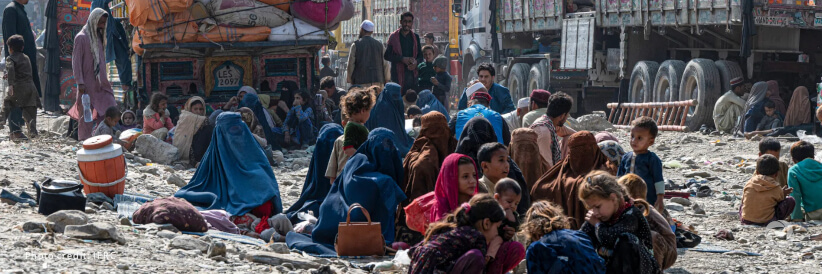Nearly one million Afghans have made the challenging journey back to Afghanistan from Pakistan in the last 18 months, with almost 145,000 people returning this month alone – a massive eight times more than in February.
Upon return, many of these people are confronted with dire conditions, including overcrowded temporary shelters accommodating up to 4 families in one tent. The unprecedented increase in people returning in a short time (an estimated 4 to 6,000 people crossing borders daily) is placing immense strain on Afghanistan’s already fragile healthcare system, essential services, and food stocks.
Initially, the International Federation of Red Cross and Red Crescent Societies (IFRC) allocated 750,000 Swiss Francs from its Disaster Response Emergency Fund (DREF) to support the Afghan Red Crescent Society (ARCS) in delivering urgently needed shelter, emergency healthcare, food, and water—basic resources that are now in short supply.
Given the scale and gravity of this escalating and intensifying crisis, however, the IFRC is launching a comprehensive Emergency Appeal, aiming to raise 25 million Swiss francs to deliver vital lifesaving aid over the next two years, covering support for recovery and reintegration, including income generation activities, vocational training,g and cash-for-work opportunities.
The appeal funds will be funneled to the most at-risk and vulnerable returnees, including pregnant women, unaccompanied children, the elderly, those with disabilities, and families lacking shelter. The aim is to mitigate threats such as gender-based violence, malnutrition, and social marginalization, and to ensure that vital assistance reaches those in greatest need.
The humanitarian challenges facing returnees are profound and heartbreaking. Many have sacrificed their livelihoods, belongings, and stability in Pakistan, only to face overwhelming difficulties upon their return to Afghanistan. Children, already more at risk, are suffering from malnutrition and urgently require specialized care and nutritional support. In many cases, families have been torn apart during their migration journey, leaving individuals stranded and desperate to reconnect.
Salima, a mother who gave birth to her baby at Spin Boldak Crossing Point in Kandahar while on the move, said: “My children were born in Pakistan and don’t have any form of identification. I don’t know how or where to obtain ID cards for them. Their education has already been delayed significantly, and I don’t know how to enroll them in schools here in Afghanistan. We have no shelter in Kabul or Baghlan. We don’t know where to go or how to meet our daily needs.”
Beyond immediate relief, we must act decisively to provide long-term support that empowers people to rebuild their lives, gain access to education, secure livelihoods, and reintegrate into their communities in Afghanistan.
Mawlawi Sheikh Shahabuddin Delawar, Acting President of the Afghan Red Crescent Society (ARCS), makes a heartfelt plea for swift action: “Returnees are facing insurmountable challenges—many have lost their homes, livelihoods, and loved ones along their journey. Women, children, the elderly, and people with disabilities are particularly vulnerable, and ensuring their safety and dignity must be our highest priority. Through this emergency response, we are dedicated to delivering lifesaving aid now and providing sustainable support that respects their dignity as they work to rebuild their lives.”
Ahmed Suliman, the interim IFRC Head of Delegation in Afghanistan, highlighted the urgency of the situation: “This crisis is evolving at an alarming pace, and its impact will resonate with millions of already vulnerable people. Our immediate focus is on delivering essential aid—food, healthcare, and shelter—to those in desperate need. Simultaneously, we are committed to partnering closely with ARCS, Red Cross and Crescent Movement partners and other stakeholders to create long-term solutions that enable returnees to restore their lives and heal from this crisis.”
The IFRC urgently calls upon the international community, partners, and donors to unite in support of Afghans during this critical juncture. The contribution to the Emergency Appeal can make a life-changing difference, ensuring that those who are returning or displaced have the opportunity to rebuild their lives in safety and dignity.

